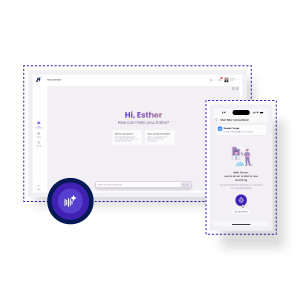Artificial intelligence (AI) is transforming healthcare. In particular, a new form of AI called generative AI (GenAI) is poised to revolutionize how physicians diagnose, treat, and interact with patients. Wolters Kluwer’s survey of U.S. physicians shows that while doctors acknowledge the potential of this technology, they still have valid concerns around trust and transparency. This article by HealthOrbit provides an in-depth look at the survey findings and what they mean for the future of AI in medicine
Key Findings
40% of U.S. physicians are ready to use GenAI this year when interacting with patients. This signals rapid acceptance of the technology.
68% of doctors say their views on GenAI have changed over the past year – they now see it as beneficial to healthcare.
But 91% want assurances that GenAI tools use content created by medical experts. 89% need transparency on source material.
81% believe GenAI will improve care team interactions with patients. Over half think it will save 20% or more of their time.
Doctors and patients differ on readiness for clinical use of GenAI. Only 21% of doctors believe patients would be concerned, versus 80% of patients who say they would be.
Physicians Come Around to Clinical GenAI
Over two-thirds of the doctors surveyed indicate that their opinions about GenAI have shifted to become more positive over the past year. In 2021, many physicians expressed doubts about introducing AI into medical practice. But today 40% say they are ready to use GenAI at the point of care in 2023.
What changed their minds? Primarily, a realization of how GenAI could benefit their practice and patients. The top advantages physicians cited were:
Improving care team interactions with patients (81% agree)
Saving time quickly searching medical literature (68%)
Summarizing patient data from EHRs (59%)
Enhancing clinical decision making (55%)
As Dr. Peter Bonis, Chief Medical Officer at Wolters Kluwer Health, notes: “Physicians are open to using generative AI in a clinical setting provided that applications are useful and trustworthy.”
Transparency and Trust Are Paramount
The survey makes it clear – physicians need to trust GenAI before using it. Their top requirements:
Content created by doctors and medical experts (91% agree)
Transparency from vendors on data sourcing and creation (89%)
Technology from established healthcare IT companies (76%)
Guidelines and policies on GenAI use are still developing. Over a third (37%) of doctors say their organizations currently have no GenAI guidelines. Another 46% don’t know if any exist.
Doctors are appropriately cautious about introducing new clinical technologies. But the survey shows GenAI has won over a majority of physicians, as long as key conditions of trust and transparency are met.
Differing Views on Consumer Acceptance
There is a disconnect between doctors and patients on readiness to adopt GenAI. Two-thirds of physicians think patients would be confident in GenAI-generated recommendations. However, just over half of consumers say they would be confident, according to another survey.
And only 21% of doctors believe patients would be concerned about using GenAI diagnostics. Yet when asked directly, 80% of consumers said they would be concerned.
This suggests more education and communication is needed on how GenAI benefits health consumers. As the technology proves itself, patient trust levels may rise. But proactive engagement will ensure GenAI achieves its potential to improve care.
A Responsible Approach to Clinical GenAI
Health technology leaders like Wolters Kluwer Health are taking thoughtful steps to integrate GenAI into clinical settings. Through extensive testing and focus on trust, they aim to provide doctors with AI tools they can rely on.
For instance, Wolters Kluwer recently expanded trials of its AI Labs clinical GenAI solution to 100 U.S. hospitals. AI Labs taps a trusted source – the clinical recommendations in UpToDate – to power its GenAI. This ensures responses are grounded in expert-authored guidelines.
As GenAI evolves, similar diligence to prioritize transparency, quality information, and responsible use will be critical. With this patient-centric approach, GenAI can transform medicine for the better.
How HealthOrbit Can Help the Physicians in Embracing the GenAI?
HealthOrbit leverages cutting-edge AI and natural language processing to revolutionize clinical documentation. Our real-time transcription accurately captures patient encounters, integrating seamlessly with your EHR system to facilitate documentation. We customize our platform to your specific needs, whether in general medicine or specialized fields.
Most importantly, HealthOrbit prioritizes the privacy and security of your data. We adhere to HIPAA and other regulations to keep patient information protected. This allows you to focus on delivering excellent care, while we handle the burdensome documentation process.
By streamlining note-taking and coding, HealthOrbit saves you time, reduces errors, and boosts revenue cycle management. Our automation and integration capabilities help cut down on duplicate data entry and rejections. This means more time for patients and lower operational costs.
Contact us to learn how HealthOrbit uses AI to increase provider productivity, ensure accuracy, and improve outcomes. We offer the next generation in intelligent documentation tailored for modern medical practices.
Reference
https://www.wolterskluwer.com/en/news/gen-ai-clincian-survey-press-release




